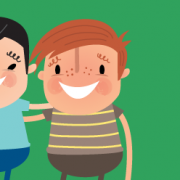Masked reality game
Help your children thoughtfully choose a character they would like to be, then use large paper bags or paper plates to help your children make a mask featuring that character.
Caution your children to choose well, as they will have to wear the mask and pretend to be their chosen character for a long time. If they choose to be an animal, for example, they will spend a long time crawling on the floor. Caution them, too, that other people will treat them according to the character they choose.
Once your masks are ready, put them on and go about your usual tasks, but stay “in character,” with each person acting like the character depicted by the mask they are wearing.
Since masks limit vision, don’t let your children wear their masks outdoors or for active play. For less visual obstruction, cut larger eye holes.
When your children are tired of play acting, move on to the discussion questions.
Questions for discussion
- Why did you want to quit wearing your mask?
- Who were you this morning when you got up?
- Who will you be when you go to bed tonight?
- Who am I?
- Who was I acting like?
- What did you like about being ________?
- Was there anything you didn’t like about being your character?
- Would you want to wear a mask all the time?
- What it would be like if a dog walked around acting like a cat? Or vice versa?
- Have you ever wished you were someone else?
- Why do you think someone would spend their days pretending to be someone they are not?
- What do you think God would say if you went around pretending to be someone you are not?
- Is there anything you think God would want to change about me or you?
Key concepts
Wearing a mask or pretending to be someone you are not gets tiring after a while. Some people who don’t like themselves much actually hide who they really are from others. They think other people won’t like who they are, so they say and do things based on what they think will make other people like them.
Doing and saying things to try to make people accept you is called “wearing a mask.” It’s not a mask you can see. It means the person becomes very skilled at acting in a certain way to please others because they are afraid to just be themselves. It’s hard work to wear a mask (real or make believe) all day long. It’s much easier to be ourselves – the people God created us to be.
The only thing God ever wants to change about us is our sinful attitudes and behaviours. We don’t need to “wear a mask” to cover up our sin because God already sees it! The best news is that when we let God know we are sorry for sinning, He is pleased to forgive our sins and promises to send His Holy Spirit to live in us and make us more like Him.
After your talk, pray together and ask God to help your children see themselves as He does – as loveable and full of potential.
Relevant Scripture
1 John 1:8-9 “If we claim to be without sin, we deceive ourselves and the truth is not in us. If we confess our sins, He is faithful and just and will forgive us our sins and purify us from all unrighteousness.”
Galatians 5:22-23,25-26 “But the fruit of the Spirit is love, joy, peace, patience, kindness, goodness, faithfulness, gentleness and self-control. Against such things there is no law. . . . Since we live by the Spirit, let us keep in step with the Spirit. Let us not become conceited, provoking and envying each other.”







